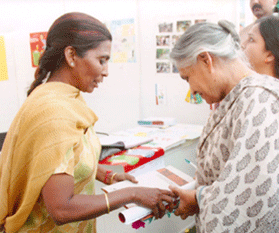 INTERVIEW INTERVIEW
|
Doors have opened and so have minds, says Usha ji
Parvinder Singh
Source: Toxics Link, Date: , 2008
How did the Defence Colony zero-waste community initiative come about?
It all started with packets of organic compost that some members of the Residents' Welfare Association (RWA) from Defence Colony chanced upon at an event during Bhagidari meet in December, 2002. They thought we were selling organic tea. They were shocked to learn that what they were mistaking for tea leaves was composted manure prepared from waste that come from peoples' kitchen.
This marked beginning of a community partnership, that led to a very successful intervention to manage municipal waste in an environmentally responsible and safe way. Today, the community has achieved sustainability and is a model for others.
What were the challenges in getting across to the community?
We started in the heat of 2002 June and one of the first thing that we took-up was a baseline survey for assessment of the existing scenario. The doors were closed as soon they were opened. People took time warming-up, but it was not too bad as they understood it wasn't something that will stall or disrupt their routine.
 If the community itself manages a unity on the need for change it paves the way for implementation and then rest of the challenges are sorted out. But it is very important that the system that we are planning is explained well and in its entirety to people. If the community itself manages a unity on the need for change it paves the way for implementation and then rest of the challenges are sorted out. But it is very important that the system that we are planning is explained well and in its entirety to people.
Do you think, the community's response differs in terms of its socio-economic profile?
Yes, it does. In fact the task of getting the residents excited about the waste programme was not very problematic in Defence Colony as the level of awareness is higher and they were also equipped to handled management of the waste workers and the composting pits.
Residential areas have their own dynamics and if there are conflicts, it becomes difficult to get people to agree upon things like the revenue models or even logistics like space and location of the composting pits.
How have attitudes changed in the community itself?
A sense of responsibility was already taking shape in the Defence Colony RWA, and that is why they showed interest in collaborating with us. But the outlook, that it is our waste and as residents we have to take the responsibility for its management, is indicative of a pro-active society. I feel very happy to see these changes as it gives meaning and value to the ground work that we have done along with the community. |
|


 If the community itself manages a unity on the need for change it paves the way for implementation and then rest of the challenges are sorted out. But it is very important that the system that we are planning is explained well and in its entirety to people.
If the community itself manages a unity on the need for change it paves the way for implementation and then rest of the challenges are sorted out. But it is very important that the system that we are planning is explained well and in its entirety to people.